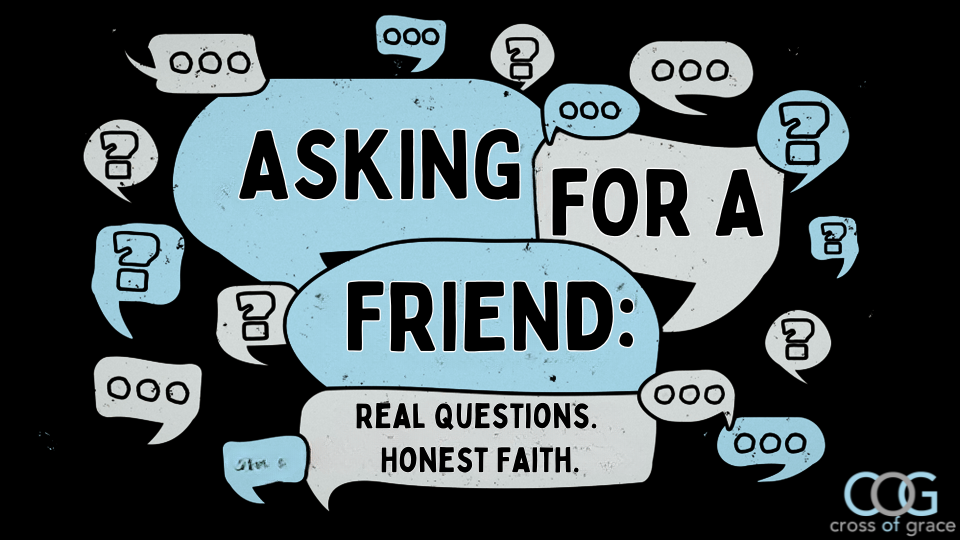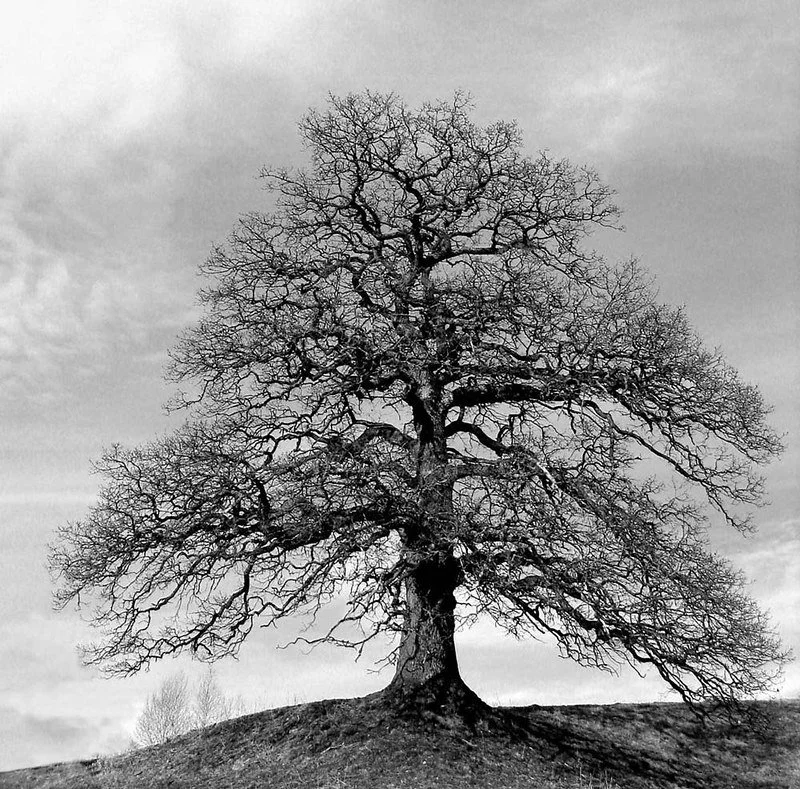John 1:1-4, 14-18
In the beginning was the Word, and the Word was with God, and the Word was God. He was in the beginning with God. All things came into being through him, and without him not one thing came into being. What has come into being in him was life, and the life was the light of all people.
And the Word became flesh and lived among us, and we have seen his glory, the glory as of a father’s only son, full of grace and truth. (John testified to him and cried out, “This was he of whom I said, ‘He who comes after me ranks ahead of me because he was before me.’ ”)
From his fullness we have all received, grace upon grace. The law indeed was given through Moses; grace and truth came through Jesus Christ. No one has ever seen God. It is the only Son, himself God, who is close to the Father’s heart, who has made him known.
We’re in week three of this series: Asking for a Friend. Real Questions. Honest Faith. We gathered your questions and promised to answer them faithfully. This week: “Do churches or denominations change the meaning of the Bible to fit what they want it to say?”
It’s a timely question. Just this week, I saw too many stories and news clips about a pastor in Idaho saying things like: women shouldn’t vote, “godly women are designed to make sandwiches,”
and that Southern slave owners weren’t sinning because their relationships with enslaved people were based on “mutual affection and confidence.” Doug Wilson, the pastor who said those awful things, believes they are gospel truth because he thinks he has Scripture to back it up.
Like Titus 2:5 which says: young women should be “good managers of the household, kind, and submissive to their husbands, so that the word of God may not be discredited.” Or Ephesians 6:5: “Slaves, obey your earthly masters with respect and fear, and with sincerity of heart, just as you would obey Christ.”
If we don’t agree with him, he’d probably say we’ve changed the meaning of the Bible to fit what we want it to say. Anyone who believes there’s only one correct meaning of a text would say the same. Disagree, and you’re wrong. But here’s the thing: there isn’t just one correct meaning.
For too long, we’ve treated the Bible like a locked box, hunting for the interpretive key to the writer’s original intent. But words are more complicated than that. They carry layers of meaning, history and emotion. Most communication holds more than one meaning.
So No, we don’t change the meaning of the Bible—because there isn’t just one. We interpret it. We ask: what does this mean for us here, now, in our lives? Sure, some twist Scripture for personal gain. Paula White, for instance, claimed John 11:44 meant people should give her $1,144 to receive a prayer cloth that could possibly bring them miracles.
Others accuse us of twisting Scripture to justify our welcome of LGBTQ+ siblings, as a way of attracting more people. Truthfully, if that were our aim, we wouldn’t offer such a bold, hospitable welcome.
We are the only church in this county to do it—and we do it because the Word of God calls us to, not as a marketing ploy.
If we are following the 8th commandment (of not bearing false witness) and interpreting our neighbors’ actions in the best light, we’d say most people interpret Scripture in search of the Truth with a capital T. The real question we want answered is: whose interpretation is right? Whose is wrong? And why?
Seminary students spend three years wrestling with this. Some pastors and theologians spend their whole lives. And you want me to answer it in 10 or 12 minutes? Sure.A small caveat, I am answering from a Lutheran perspective because it is what I know. That is not to say it’s the most right, though I do think it’s pretty useful. There are surely other ways to interpret Scripture that are insightful and faithful.
But as Pastor Mark said last week, you asked me, sorta, so this is what you get. And so much more could be said, so this is not exhaustive by any means, but it’s a start.
As Lutherans, we can’t talk about interpretation without first talking about what the Word of God is. And you might think, well it’s just the Bible, that's the Word of God. Well not exactly. First and foremost, the Word of God is Jesus. John says, “The Word became flesh and lived among us.” It’s not a book that became flesh—it’s God in Christ. Jesus is the Word. What this means is that we see and understand God most through and because of Jesus.
Second, the Word is proclaimed. After the Word became flesh, lived among us, died, and rose, the story could not be contained. People shared it, again and again—witnessing, preaching, proclaiming Christ. Through that proclamation, we encounter Jesus. We hope that’s what happens here on Sundays…
That you encounter Jesus through this preaching and that it confronts us, transforms us, and pushes out into the world holding onto the promises God makes to us.
And then Third, the Word is the written Word—the Bible—because and insofar as it points us to Jesus. The whole Bible, as one story, reveals Christ. Some parts though point more clearly: the gospels, Jesus’ teachings, his death and resurrection, and for Luther, the book of Romans. These show most vividly what Christ’s life and death mean for us.
Other passages, like Titus 2:5 urging women to be submissive, reflect cultural norms more than the gospel’s promise of oneness and equality, proclaimed most boldly in Galatians 3:28. How can we say this? Jesus lifted up the role of women. He taught unity, servitude, placing others before ourselves—but never that women must submit. These messages echo far more deeply than cultural instructions ever could.
But someone might ask, how can one Scripture matter more than another if all Scripture is inspired by God, as that passage from 2 Timothy says plainly: “All scripture is inspired by God”? I’m not disagreeing with that. But Scripture points us to Jesus. We don’t worship the Bible. We worship Christ. Sometimes I fear we get that confused.
The Bible is a tool, a means by which the Holy Spirit shows us God’s love revealed in Jesus’ life, death, and resurrection. And when we see that, it changes us. It transforms us. It shapes how we live. What matters most in interpreting Scripture isn’t only what it means. Yes, understanding the original intent matters. But what matters most isn’t just what the Bible means, but what the Bible does.
The Word of God does something to you, to us. When we hear it, when we read it together, when we listen to it proclaimed, the Holy Spirit is at work through that Word. After all it is a living and active Word, not just ink on a page. it calls us, moves us, and shapes us, so much so that we live differently because of it.
Take for example that passage from Exodus: You shall not wrong or oppress a resident alien. If you are an immigrant or refugee, that word is certainly good news because it shows how God longs for their care and well-being in every time and place. It must give comfort and hope to the desperate migrants in search of safety for themselves and their families. But it also confronts those who see no problem with the rhetoric and policies that harm them.
And it should move those of us—like me—who have done nothing, who have simply shaken our heads and said, “How terrible,” without stepping forward to help our immigrant siblings. The Word meets us here, calling us to act, to love, to bear witness to God’s justice.
You’ve heard it said that people can make the Bible say whatever they want it to say. And that’s true.
But I am more interested in what the Bible, what the Word of God makes one do. So if the meaning you find in the text doesn’t make you afflict the comfortable and comfort the afflicted,
if it doesn’t widen the bounds of your love,
if it doesn’t encourage unity, or extend forgiveness, or move you toward repentance,
and offer grace with no strings attached, then find a different, more Christ like meaning.
Because the way we interpret scripture is by reading all of it through the lens of Jesus Christ, through whom we all have received grace upon grace.
And that’s the gospel truth.
Amen.





